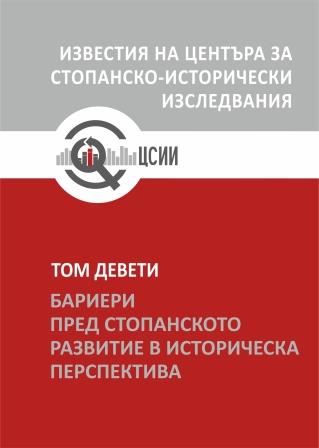Наблюдения върху българската фискална политика и международната търговия: изследване на преместването на българските търговци от пазара в Константинопол в Солун през 893–894 година
Observations on the Bulgarian Fiscal Politics and International Commerce – a Survey on the Transfer of the Marketplace of Bulgarian Merchants from Constantinople to Thessaloniki in 893–894
Author(s): Mikhail RaevSubject(s): History, Economy, Business Economy / Management, Comparative history, Economic history, Political history, Middle Ages, Marketing / Advertising
Published by: Център за стопанско-исторически изследвания
Keywords: medieval economy; medieval commerce; Byzantine-Bulgarian war of 894-896
Summary/Abstract: The Byzantine-Bulgarian War of 894–896 was sometimes called the first economic war in medieval Europe. The expulsion of Bulgarian merchants from the Constantinopolitan market and their transfer to the market of Thessaloniki served as a cause de la guerre for Bulgarian ruler Symeon. A survey of historiography concludes that most scholars resorted to a restatement of the historical facts conveyed by Byzantine written sources. While scholars attempted to clarify the status of Bulgarian merchants in the Byzantine capital, the paper raises questions concerning the commodities Bulgarians supplied to the Byzantine market and what they demanded in exchange. The paper explores how Bulgarian ruler Simeon was affected by the transfer of Bulgarian merchants away from the Byzantine capital by applying methods of enquiry such as textual analysis and comparison of historical data. The military response of the Bulgarian ruler allows various hypotheses. The paper proposes that Bulgarian merchants most likely exchanged goods for multiple types of Byzantine and non-Byzantine textiles, not on the list of forbidden articles to export. The Book of Eparch informs us that Byzantine-Bulgarian commerce was in kind via barter exchange. Based on the examination of the commercial terms stipulated in the tenth-century Byzantine-Rus treaties, the paper considers the issue of Symeon’s involvement in Byzantine-Bulgarian commercial affairs in a similar fashion to the Rus princes who sent their envoys and merchants to the Byzantine Empire to sell the surpluses of collected taxes in kind. The paper addresses the issue of fiscal policy and taxation practise in the ninth-century Bulgaria.
Journal: Известия на Центъра за стопанско-исторически изследвания
- Issue Year: IX/2024
- Issue No: 1
- Page Range: 56-66
- Page Count: 11
- Language: Bulgarian

